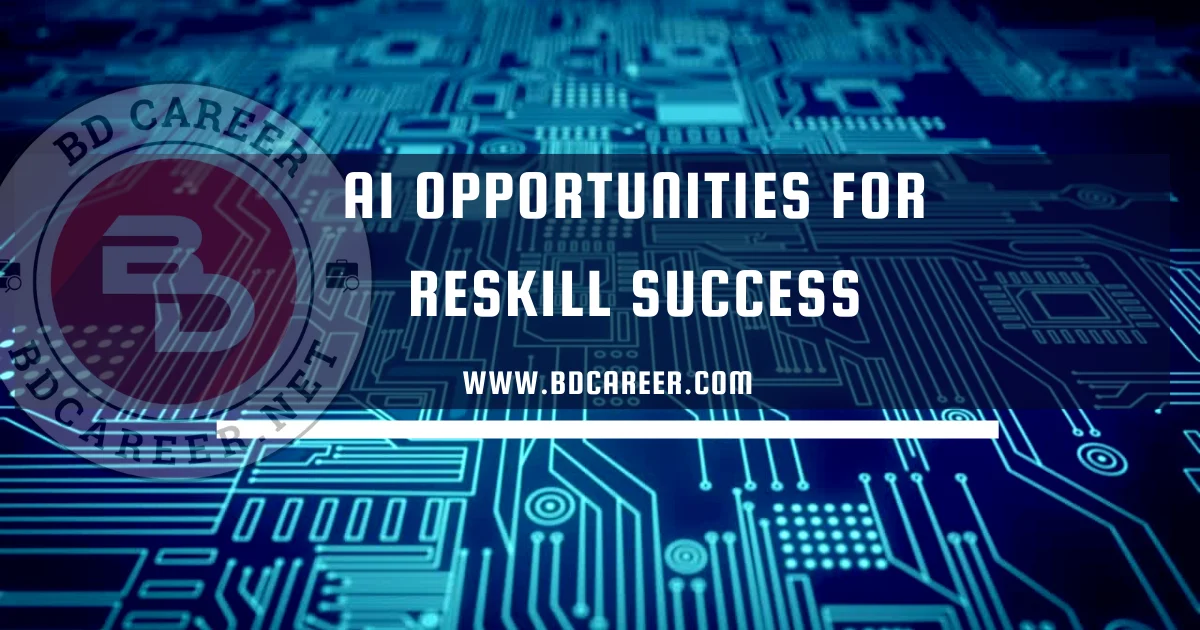In an era of rapid technological breakthroughs, integrating artificial intelligence (AI) into numerous businesses alters the labor environment. As automation grows more pervasive, the need for labor reskilling and upskilling is more critical than ever. This article offers a complete guide to AI and navigating the transition to AI-driven occupations, emphasizing identifying necessary skills, recommending reskilling options, investigating alternative education methods, and stressing the need for transferable abilities and adaptability.
Contents
- The Changing Job Landscape for AI
- The Importance of Reskilling for AI
- Critical Skills for the AI-Driven Future
- Identifying Essential Skills for AI-Powered Jobs
- Recommendations for AI Reskilling and Upskilling Workforces
- Exploring Alternative Education Models and Career Pathways
- Highlighting the Importance of Transferable Skills and Adaptability
- Conclusion
The Changing Job Landscape for AI
The rise of AI is reshaping employment patterns across various industries. Automation is replacing routine tasks, and jobs that once seemed secure are now at risk. However, this transformation is not all bleak. New sectors are emerging, creating demand for roles that require a deep understanding of AI technologies. As we navigate this shift, it is crucial to identify which jobs are at risk and where the opportunities lie.
The Importance of Reskilling for AI
Reskilling is the key to adapting to the AI-driven future. It involves acquiring new skills and updating existing ones to remain competitive in the job market. Proactive adaptation is essential for career sustainability, and the benefits of reskilling extend beyond individual success to the overall resilience of industries and economies. Examining successful reskilling initiatives provides valuable insights into the positive impact of this transformative process.
Critical Skills for the AI-Driven Future
Individuals need technical and soft skills to thrive in an AI-driven job market. Technical proficiency in machine learning, data science, and programming is in high demand. However, soft skills like critical thinking, creativity, and emotional intelligence are equally important. The ability to adapt to change and a commitment to continuous learning are becoming indispensable qualities for success.

Identifying Essential Skills for AI-Powered Jobs
Technical Proficiency in AI and Machine Learning
The foundation of AI-driven careers lies in technical proficiency. Individuals must familiarize themselves with AI and machine learning concepts. Online courses from Coursera, edX, and Udacity offer comprehensive programs ranging from beginner to advanced. Understanding algorithms, data structures, and programming languages like Python becomes crucial in navigating the AI landscape.
Data Literacy and Analysis
Data is the fuel that powers AI systems. Individuals must develop a strong sense of data literacy, including gathering, interpreting, and analyzing data. Tools like Tableau and Power BI can aid in visualization, while a deep understanding of statistical concepts is essential for drawing meaningful insights from datasets.
Problem-solving and Critical Thinking
AI-powered jobs often involve solving complex problems. Developing critical thinking skills enables individuals to approach challenges systematically and creatively. Problem-solving exercises and case studies can hone these skills, applying theoretical knowledge practically.
Communication, Collaboration, and Creativity
While technical skills are vital, soft skills are equally important. Effective communication ensures that AI-driven insights are understood and acted upon. Collaboration fosters an environment where diverse skills complement each other, fostering innovation. Creativity, often associated with human intelligence, is valuable in generating unique solutions.
Industry-Specific Knowledge of AI
Each industry has its unique challenges and requirements. Acquiring industry-specific knowledge ensures that AI applications are aligned with business goals. Professionals must stay informed about the latest trends and developments in their respective sectors.
Recommendations for AI Reskilling and Upskilling Workforces
Online Learning Platforms and Courses
Online learning platforms offer a flexible and accessible way to acquire new skills. Platforms like LinkedIn Learning, Khan Academy, and Skillshare provide various courses covering AI, machine learning, and related subjects. Employers can encourage employees to leverage these resources for continuous learning.
Corporate Training Programs
Many organizations recognize the importance of reskilling their workforce. Corporate training programs, whether developed in-house or outsourced, can be tailored to meet specific organizational needs. These programs may include workshops, seminars, and hands-on projects to ensure the practical application of learned skills.
Government Initiatives and Funding
Governments worldwide are acknowledging the need for reskilling in the face of automation. Various initiatives and funding programs support individuals and businesses in their reskilling efforts. Employers and employees should explore available resources and take advantage of government-backed programs.
Collaboration with Educational Institutions
Partnerships between businesses and educational institutions can bridge the gap between academic knowledge and practical skills. Internship programs, guest lectures, and collaborative research projects create an ecosystem where theoretical learning seamlessly integrates with real-world applications.
Mentorship and Peer Learning
Learning from experienced professionals in the field accelerates the reskilling process. Establishing mentorship programs within organizations fosters knowledge transfer, while peer learning initiatives encourage collaborative problem-solving. These interpersonal interactions enhance the overall learning experience.

Exploring Alternative Education Models and Career Pathways
Micro-Credentials and Digital Badges
Traditional degrees are no longer the sole measure of expertise. Micro-credentials and digital badges showcase specific skills and achievements. Platforms like Credly and Badgr allow individuals to display a comprehensive portfolio of their capabilities, providing a more nuanced understanding of their expertise.
Project-Based Learning and Real-world Applications
Hands-on experience is invaluable in the AI era. Project-based learning allows individuals to apply theoretical knowledge to real-world scenarios. Working on projects develops problem-solving skills and enhances the ability to navigate challenges encountered in practical applications.
Apprenticeships and Internships
Apprenticeships and internships offer a bridge between education and employment. Companies can provide hands-on training while identifying and nurturing talent. Participants gain practical experience, making them more attractive candidates for AI-powered roles.
Continuous Learning and Lifelong Education
The concept of education as a one-time event is outdated. Embracing continuous learning as a lifestyle ensures professionals remain adaptable in the face of evolving technology. Lifelong education involves regularly updating skills and staying informed about industry trends.
Hybrid Learning Models
Blending traditional and online learning models creates a flexible and personalized approach to education. Hybrid learning combines the benefits of face-to-face interactions with the convenience of online resources, catering to diverse learning styles and preferences.
Highlighting the Importance of Transferable Skills and Adaptability
Transferable Skills in the AI Era
While technical skills are crucial, transferable skills are the backbone of adaptability. Critical thinking, adaptability, and emotional intelligence remain relevant across various roles and industries. Developing a balance between technical and transferable skills ensures long-term success.

Adaptability as a Core Competency
Adaptability is a core competency in the ever-changing landscape of AI. Individuals must embrace change, continuously seek new challenges, and be open to acquiring new skills. Adaptable professionals are better equipped to navigate uncertainties and capitalize on emerging opportunities.
Building a Growth Mindset
A growth mindset is the foundation for embracing challenges and learning from failures. Individuals with a growth mindset see effort as the path to mastery and view challenges as opportunities for development. Cultivating a growth mindset fosters resilience and a positive approach to continuous learning.
Strategies for Embracing Change
Successfully navigating the transition to AI-driven jobs requires proactive strategies. Regular self-assessment, setting achievable goals, and networking with industry professionals contribute to a proactive approach. Embracing change as a continuous part of professional development fosters a mindset of growth and improvement.
Success Stories of Individuals Embracing Adaptability
Real-world success stories serve as inspiration for those embarking on the reskilling journey. Highlighting individuals who successfully transitioned to AI-powered careers through adaptability and continuous learning motivates others to follow suit. These stories demonstrate that anyone can thrive in AI with determination and the right resources.
I have previously published many other articles. If you want to see them, click here.
Conclusion
To summarize, great reskilling for AI-powered employment is a journey that necessitates a mix of technical proficiency, ongoing learning, and adaptability. Identifying necessary talents, utilizing various reskilling options, investigating alternative schooling methods, and appreciating the value of transferable abilities are all critical components of a successful shift. Individuals, organizations, and governments all play crucial roles in ensuring a sustainable and dynamic future as the workforce adapts to the challenges and opportunities posed by AI. In the age of artificial intelligence, embracing the reskilling journey is more than a requirement; it is an investment in personal and professional progress.
